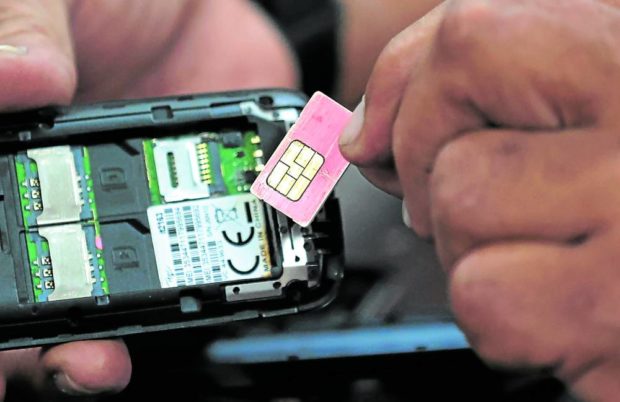MANILA, Philippines — The new law mandating registration of all subscriber identity module (SIM) cards “will undoubtedly add more teeth” to authorities in the fight against online or mobile phone crime, including over 4,000 SIM card-related offenses recorded in the first nine months of 2022, the Philippine National Police said on Tuesday.
PNP chief Gen. Rodolfo Azurin Jr. said the pandemic had pushed many criminals to shift to activities “using telecommunication and cyberspace platforms,” as they were forced to stay at home during the community quarantines of the past two years.
The PNP’s Anti-Cybercrime Group (ACG) reported a total of 4,254 SIM card-related offenses from January to September, excluding cases handled by other agencies or PNP units.
Almost all, or 4,193 cases, were online scams involving electronic wallet apps such as GCash, Maya, and Coins.ph, while 38 were text scams, 14 bank fraud cases, and nine others linked to the spread of “fake news.”
Based on ACG data, SIM card-aided crimes have spiked consistently year-on-year. From only 236 reported cases in 2020, it jumped to 1,895 in 2021, a 703-percent increase. From 2021 to the first nine months of 2022, the number climbed by 124.5 percent.
‘Crime of millennium’
“Most of the crimes now are being done online. Cybercrime is the crime of the millennium,” ACG spokesperson Lt. Michelle Sabino said.
But an activist scientist group doubted the law would address mobile phone scams at all, saying it would instead disenfranchise millions of poor Filipinos with no means of registering their SIM cards.
The law would also risk consumers’ privacy and security amid the government’s crackdown on critics, it said.
“Marginalized communities such as urban poor, poor farmers, and indigenous peoples from far-flung areas will suffer as they have little means to register their SIM card,” said Chuckie Calsado, chair of Advocates of Science and Technology for the People (Agham).
“This law will make the lives of millions more miserable if they are cut off from their cellular communication,” Calsado added.
Based on figures from Smart Communications Inc., Globe Telecom Inc., and Dito Telecommunity Corp., there are about 120 million mobile users in the country, of whom 95 percent use prepaid SIM cards.
Agham argued that the law would only criminalize the failure of ordinary citizens to register their SIM cards, instead of the criminal groups being targeted.
‘Countermeasures’
But Azurin said he was confident that the benefits of mandatory SIM card registration “outweigh the perceived privacy issues and other concerns.”
A study by the global insights company Trans-Union in March last year showed 44 percent of Filipino consumers had been targeted by digital fraud attempts within the past three months, while enterprises saw a 31 percent rise in fraud attempts compared to the year before.
Sabino said the SIM registration law would enable law enforcers to identify perpetrators faster.
In the past, the ACG said it needed to secure court warrants to gain access to a user’s information, traffic data, or relevant data in the possession or control of a person or service provider.
“This really takes some time. The court would also sometimes not grant us the warrant. So it would take longer for our operatives to catch… the online criminal,” Sabino said.
On Monday, President Ferdinand Marcos signed the SIM card registration law under Republic Act No. 11934, which requires users to register all newly bought SIM cards with telcos by presenting a valid government ID. Those with existing postpaid or prepaid SIM cards have 180 days to register their number and avoid deactivation.
But a Quezon City lawmaker said the guidelines for the registration of SIM cards should include countermeasures against data and identity theft.
Quezon City Rep. Ralph Tulfo said people with no verifiable and valid IDs should not be able to register their SIM cards at all.
“They will probably use the identity of someone else. The [implementing rules and regulations] should have safeguards and countermeasures on people who register using someone else’s data and ID,” Tulfo said on Tuesday.
—WITH A REPORT FROM JULIE AURELIO
RELATED STORIES
SIM card registration law signed amid privacy concerns
SIM card registration law may compromise privacy – Bayan
SIM Card Registration Act success relies on ‘fool-proof’ Nat’l ID System – telcos
